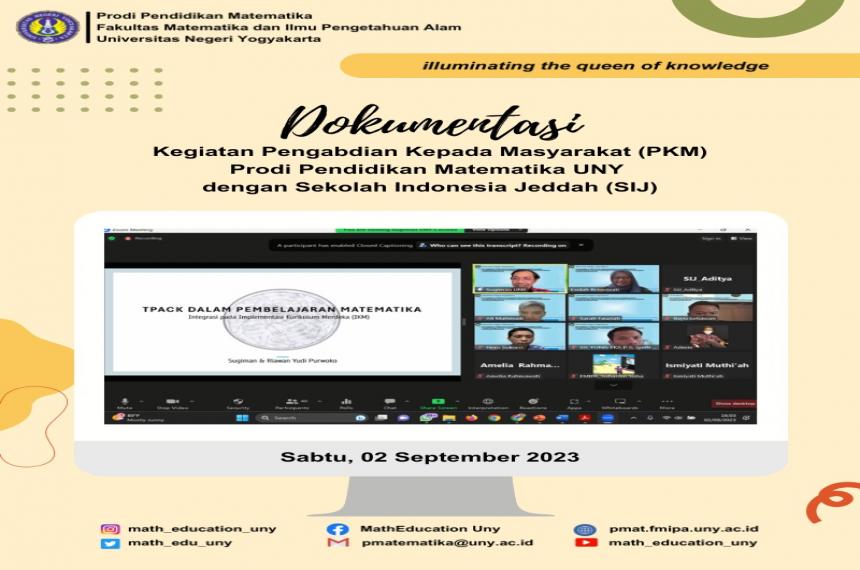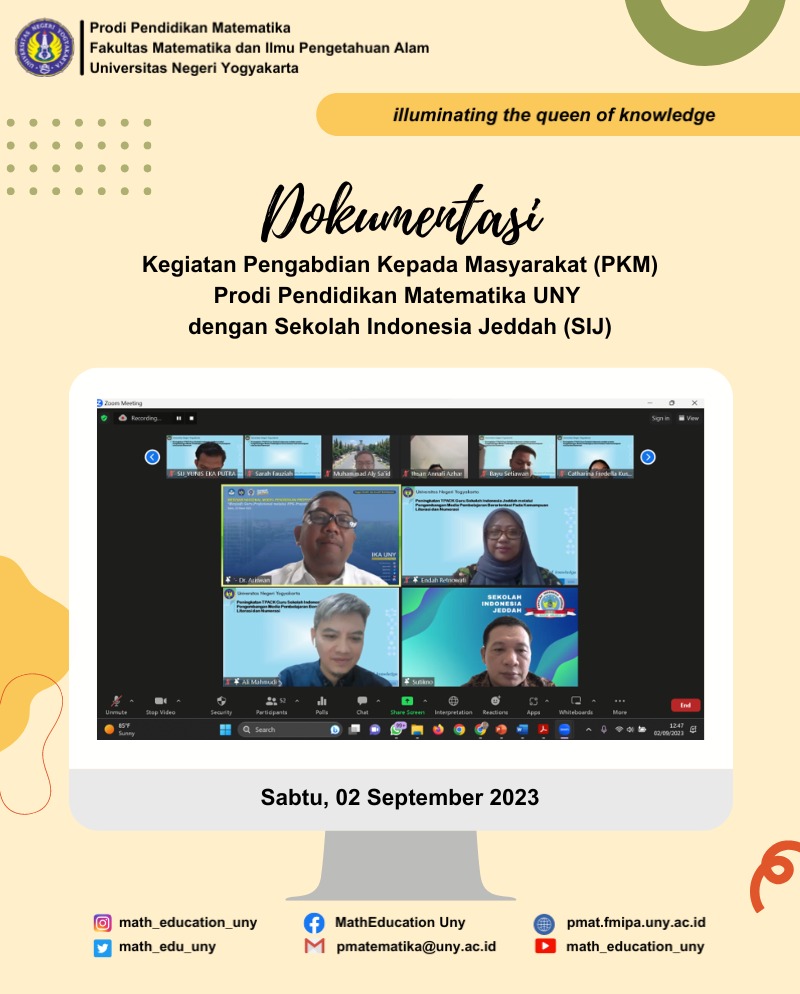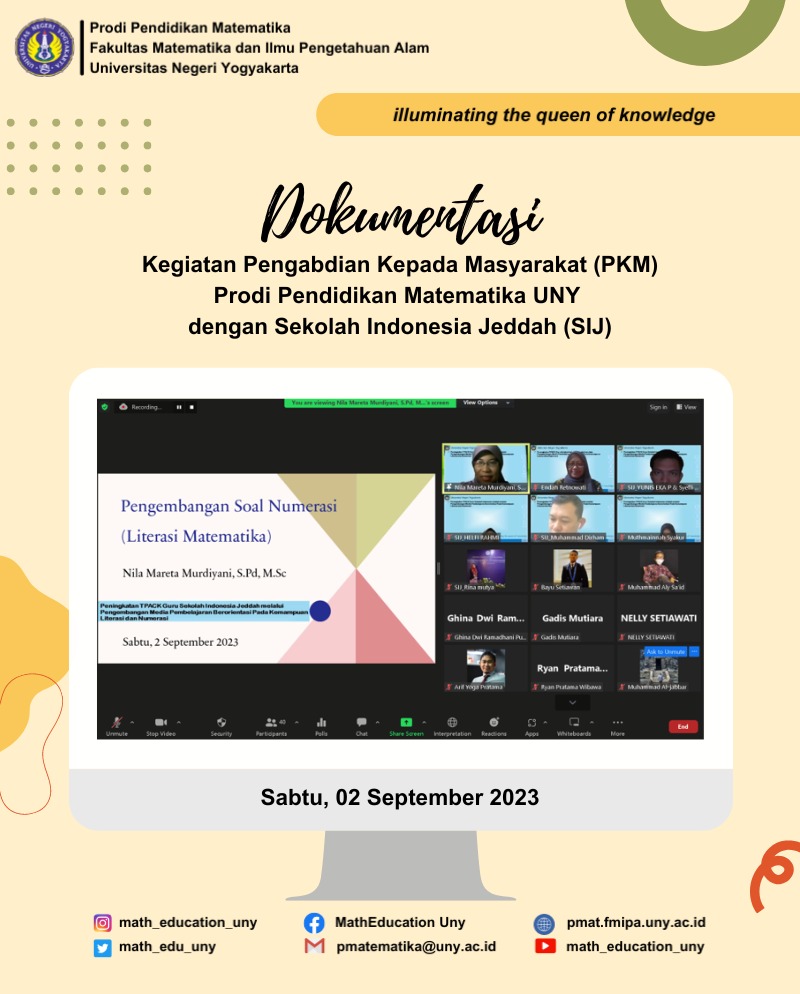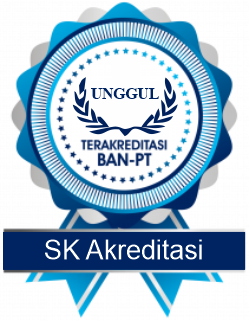Community Service Activities (PKM) of Mathematics Education Study Program UNY with Indonesian Jeddah School (SIJ)

Community Service Activities (PKM) of Mathematics Education Study Program UNY with Indonesian Jeddah School (SIJ) implements international cooperation in the form of community service activities. Dr. Ali Mahmudi, who is also a lecturer in mathematics education as well as the deputy Dean of FMIPA UNY, led the community service activity with the title “TPACK Development for Indonesian School Teachers in Jeddah through Learning Media Training Oriented to Literacy and Numeracy Skills”.
On Saturday, September 02, 2023 the Mathematics Education Study Program carried out community service in collaboration with the Indonesian Jeddah School (SIJ). The service activity is in the form of a workshop which starts at 12:30 WIB until 20:00 WIB. The agenda, which was attended by Indonesian Jeddah School Teachers and several students, was moderated by the study program coordinator of S-1 Mathematics Education, namely Endah Retnowati, Ph.D. The implementation of this activity began with remarks from the Dean of FMIPA UNY, Prof. Ariswan, M.Si. He hopes that from this activity, lecturers can provide good advice and workshops, students can gain knowledge, and teachers from schools can share experiences and learning atmosphere at SIJ. After Mr. Ariswan's remarks, continued with remarks from Mr. Sutikno as chairman of SIJ, he said that the existence of international cooperation can contribute to student service at SIJ to improve the quality of education, especially in the field of Mathematics Education. It is hoped that SIJ students can increase their curiosity in learning mathematics to excel in various Olympic competitions.

There are four areas of discussion today, namely numeracy literacy curriculum and learning, TPACK, national assessment policy, and numeracy literacy content development. The first material was the curriculum and numeracy literacy learning delivered by Mr. Ali Mahmudi. He said that the independent learning curriculum is a reference and guideline for educators so that teaching and learning activities are directed and in accordance with curriculum objectives. In Indonesia, some still experience low literacy and some educators are not optimal in teaching, making learning less meaningful. One concept of meaningful learning is that one concept correlates with the next concept. Teachers play an important role in planning learning according to the needs and abilities of students. Suhardin, one of the SIJ teachers, said that there are still some children who have difficulty in understanding math material. This makes Suhardin confused in developing learning strategies and models that are suitable to be applied. Mr. Ali Mahmudi also responded to Mr. Suhardin's anxiety. “In the classroom, not all students experience the same level of intelligence, so teachers must adjust this condition by implementing differentiated learning”. In other words, differentiated learning can be a solution to reduce students' difficulties in understanding mathematics.
The second material, “National assessment policy”, was delivered by Dr. Dra. R. Rosnawati, M.Si. She emphasized that changes in the mindset and attitude of each generation have significant differences so that teachers must be able to improve learning and adapt to students according to their era. Learning assessment consists of three, namely the assessment of students' attitudes, knowledge and skills both during learning activities, school environment and community environment. National assessment focuses on students' ability to use and evaluate knowledge gained from various curriculum materials to formulate and solve problems. He also mentioned the topic of SDGs in teaching and made questions according to the reality in the surrounding environment so that students can easily understand and apply their knowledge in everyday life.
The third material is Technological Pedagogical Content Knowledge (TPACK) delivered by Prof. Sugiman, M.Si. The use of technology in mathematics learning in the current era is very relevant to use such as excel, geogebra, websites that help math learning and so on so that students can use technology with positive things. Prof. Sugiman advised “Change our class from the smallest possible thing to make it more meaningful and fun”.
The fourth material is the development of literacy and numeracy content delivered by Mrs. Nila Mareta Murdiyani, S.Pd., M.Sc. This material contains questions related to mathematical literacy and numeracy that can build students' mathematical abilities in solving problems. She opened communication with participants by asking to work on the questions given, the participants answered each other in the comments column and argued the answers according to their respective perceptions. Although it was late at night in Indonesia and late in the afternoon in Saudi Arabia, it did not dampen the enthusiasm to follow until the clock struck 21.25 WIB or 16.24 WSA.

The agenda went smoothly, in each material session there was an open discussion and consultation with the speaker regarding the experiences and problems that exist at the Indonesian Jeddah School. The moderator said that this agenda was a forum for gaining knowledge, discussing problems in the school environment and adding insight, especially for teachers and students in preparing provisions before plunging into the school environment. At the end there was an assignment to make questions related to literacy and numeracy to be used at the next meeting on Saturday, September 09, 2023. (MA)
Copyright © 2026,



